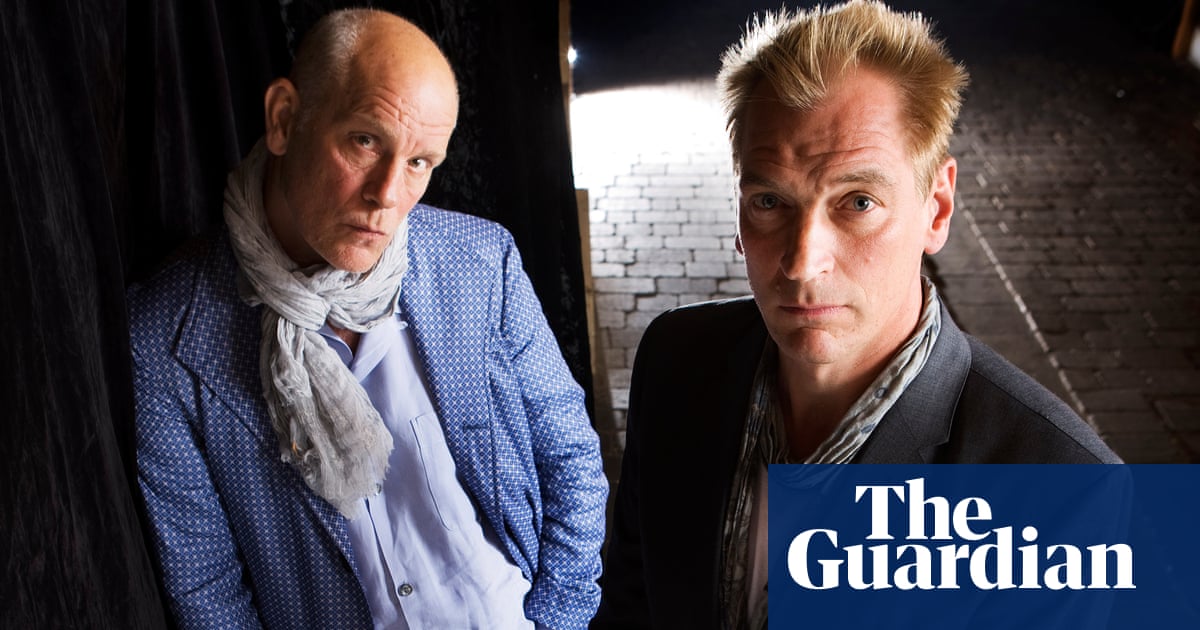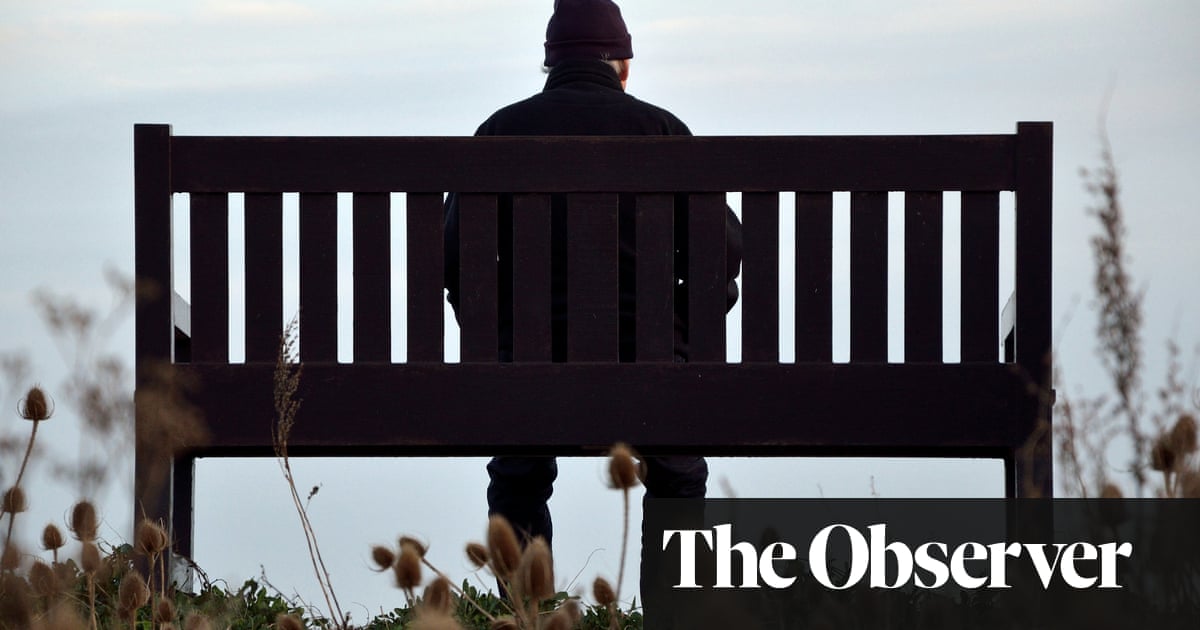
One of the last conversations John Malkovich had with Julian Sands, his best friend of 40 years, concerned how to prepare yourself for death. You can see that conversation in their new film, Seneca – On the Creation of Earthquakes, which premiered at the Berlin film festival this week. Malkovich fears it will be their last together.
Malkovich plays the Stoic philosopher of ancient Rome, an adviser and speechwriter to the despotic emperor Nero. In one scene, Seneca tells his friends: “Remind yourselves: we die every day. Death is stalking us everywhere, so it’s useless to fear or dread it.”
His audience includes Rufus, played by a spiky-haired Sands dressed in an orange ruff, silver bauble earrings and a silk gown. He sips wine and hangs on Seneca’s every word.
“Say a knot strangles you, or you fall off a cliff on to the rocks. However you go, even if it’s a ghastly thing, at least you die fast,” Seneca says. He briefly fakes his own death, falling into the lap of Rufus’s beautiful wife to do so, before rising again to tell his guests: “Kids, drink up, it’s later than you think.”
The film, says Malkovich, is “a pretty fitting tribute” to Sands, who went missing during a hiking trip in California more than a month ago. Postcards showing Sands as Rufus in the Moroccan desert, where filming took place, are laid out on a glass table in front of him.
Malkovich has little time for stoicism himself, he says. He has long stopped asking the question posed by Seneca in the film: why do bad things happen to good people? “And I don’t agree with Seneca that we choose the way we go,” he adds.
No trace of Sands has been found, but Malkovich says he is reassured the man he calls “my closest friend” was last seen doing something he loved. “I haven’t really talked about what happened with Jules,” he says. “But, in a way, it’s a choice, because he was an inveterate mountain climber/hiker. He was always tramping off to Kilimanjaro, or Antartica, or the Andes, or the Alps – a very experienced climber who’d been through very hairy experiences.
“I suppose the particular conditions on the ground that day on Mount Baldy must have led to some sort of catastrophic and immediate error that was irreversible. That was my instinct upon hearing it. But he knew what the conditions were, and that’s what he loved to do. He found great solace in the solitude of that.”
Sands was wont to go off on solo adventures, he says, “which is quite wild in itself, but he’s a boy who grew up wild on the moors and – despite being someone who could be incredibly erudite and polished – had always kept that wild part of himself”.
He wheels back to the film. “But I certainly don’t think all people choose their deaths. Some die horribly from myeloid leukemia when they’re three years old. I don’t think that’s a choice; I think that’s a pretty grotesque notion.” His gaze drifts upwards as he plucks a quote from a play he says he is preparing. “Death, we finally meet up with it by chance on the hazardous path from one light to another and we say to ourselves, so that’s all it is?”
Malkovich met Sands on the set of The Killing Fields in 1983 – two years before Sands’ breakthrough role in A Room With a View – and was immediately drawn to his wit and intellect. They worked together on a range of projects over the decades, and lived together for a while. Today, Malkovich alternates between past and present tense when speaking about Sands, his voice raspy and wistful.
“I love Jules. He was someone who was very, very clever. I know his ex-wife, Sarah [Sands, the former editor of the Evening Standard and Radio 4’s Today], terribly well and their son, Henry, is my godson. And I introduced Jules to Evgenia [his wife, also a journalist], who’s an old, old friend. I know their daughters [Natalya and Imogen] well. But I unfortunately never got to go up to Yorkshire with him. It’s a great loss.”
Speaking to Malkovich is a singular experience. He has a sartorial elegance – chaffinch-patterned shirt, matching kerchief, chocolate-brown tailored Sherlock-Holmes-style jacket – that is exquisitely out of place in scruffy Berlin.
In our brief conversation, he finds time to question the use of the word “pandemic” to describe Covid, suggesting instead “mass hysteria or a series of stupidities and mistakes, which if nothing else reflect absolutely terribly on science”.
He then moves on to his avoidance of politics. “If it was honestly about solving societal problems, I’d be all for it.” Rather, he says, politics is about “power and corruption, narcissism and insanity, incompetence, stupidity, dishonesty … the list goes on. What would happen if every time a politician told a lie, a demonstrable lie, they had to retire from politics? Leave the playing field permanently and go and, say, work in a charity, like Profumo did. How many would there be left?”
Sands’ disappearance, and the recent arrival of a granddaughter, have galvanised him. “I’ll be 70 in December,” he says. “Do I have a day, a month, a year, 10 years? No idea. Time seems even more capricious than when I had my own children. You miss so much; it goes so fast.” But he has no desire to leave a lasting mark. “I don’t really care to have a legacy or history.”
Nor, he says, is he bothered about the reception he receives now. He eagerly discusses the recent case of a German ballet director who smeared dog faeces on the face of a critic in revenge for a negative review.
“I think it’s terrible! To attempt to silence critics or even interact with them about their critique is a violation. Toughen up! It’s a mistake by those in the public eye to think that when you enter the public square it’s all going to be tropical drinks on the veranda and bouquets of flowers.”
Malkovich knows of what he speaks. In his 2017 stage show The Music Critic, he plays a vile reviewer who denounces the work of Beethoven, Chopin and Prokofiev – before musicians exact their revenge. One write-up of the show was so poor that it made him “roll off the banquette in my home laughing so hard I was crying”.
The model of stoicism in this regard, he says, was Harold Pinter: “When The Caretaker opened in Düsseldorf, he took 54 curtain calls, all to boos.” Malkovich and Sands worked frequently with Pinter and loved reminiscing about the man. “He was such a terrific storyteller, Jules, and so, so funny. Since the day we met, I could talk to him about anything, and he could talk to me about anything…” He loses his train, then jolts himself back to the room. “But that’s the thing – you can’t do anything about it. Could I have envisaged Jules at 80?” He looks at the ground and his voice trails away. “I don’t know.”












